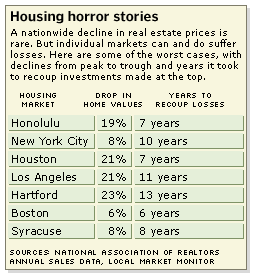BEND, Ore. (CNN/Money) -
Yeah, yeah, yeah. Interest rates have been going up. But you've locked in your low rate. Why should you care?
John R. Talbott, a visiting scholar at UCLA's Anderson School of Business and author of "The Coming Crash in the Housing Markets," has a thesis that will leave you quaking from behind your picket fence.
He describes a worst-case scenario in which rising interest rates drive down home prices, leaving an alarming number of homeowners -- particularly those who've cashed out or borrowed against their equity -- holding more debt than their house is worth.
If they sell, they would actually owe money.

Under this scenario, foreclosure rates jump as high as 5 percent, pushing down home prices and wreaking financial havoc all the way to the top of the housing food chain at Freddie Mac and Fannie Mae. With the collapse of these financial behemoths, investors would lose money, taxpayers would be stuck paying for a bailout and confidence in the banking industry would be as good as gone.
And your home? A 30 percent drop in home values isn't inconceivable, said Talbott.
"It's 1929 all over again," said Talbott, a former Goldman Sachs vice president. "This is big Depression-type stuff."
How rising rates affect home prices
Talbott's theory sounds a little over the top. But considering the housing market's run, it's not unreasonable to think that fortunes could be lost just as quickly as they were made.
And though there's never been a nationwide decline in real estate prices, individual markets have suffered plenty -- see "Real estate horror stories."
| Related articles and tools
|

|
|
|
|
Still, though most economists agree that rising interest rates will hurt home prices, it's tough to find one who thinks things will get quite so bloody.
Talbott contends that the relationship between rates and home prices is almost linear. In other words, a 30 percent increase in mortgage rates (from, say, 5.5 percent on a 30-year mortgage to around 7.5 percent) could mean as much as a 30 percent decrease in home prices.
The reason is the effect on a home's affordability. For example, a couple that could afford a $400,000 house when rates were 5.25 percent might only be able to pay $300,000 when if rates go up to 7 percent.
Others argue that the relationship isn't quite as direct. For one, when rising rates go hand-in-hand with an economic recovery, as they often do, better job prospects partially offset the effects of higher rates.
Also, when rates go up, buyers just opt for adjustable rate mortgages (ARMs), which have lower rates than fixed loans. "When rates started picking up after the last refi boom in 1993, people didn't leave the market, they just shifted into ARMs," said Eric Belsky, executive director of Harvard's Joint Center for Housing Studies.
According to David Stiff, director of economic research for Fiserv Case Shiller Weiss, rates went up 225 basis points (2.25 percentage points) in 1994. "Price appreciation really slowed but values didn't drop off," he said.
Douglas Duncan, chief economist for the Mortgage Bankers Association of America, estimates that if 30-year fixed mortgages jump past the 7 percent mark, home prices will decline 3 percent to 5 percent.
"You won't see any serious slowing unless rates jumped to 8 percent, in which case I'd expect a 10 percent decline in values," said Duncan.
Even then, he argues, prices would gradually come back as home buyers get used to a new, higher level of interest rates.
Some markets, some homeowners, more vulnerable
Some markets will surely feel more pain than others. "I'd be most concerned in places where housing affordability is an issue because the effects of rising interest rates are even more pronounced," said Stiff.
According to the National Association of Realtors affordability index, San Diego was one of the least affordable cities during the fourth quarter of 2002. There median-income families had only 69 percent of the income needed to buy a median-priced home.
In Peoria, Ill., on the other hand, families in the median had nearly three times the income needed to buy a median-priced home.
"In cheaper markets interest rates probably won't matter as much as the local economy," Stiff added. "These are places where new supply matches new demand, and you just have steady appreciation."
Similarly, not all homeowners will suffer the same. If you're not planning to move for years, a decline won't have as much of an impact.
But a decline could be a real problem for Americans who have taken advantage of the runup in prices to do cash-out refinancings. They could very well owe more than their house is worth -- bad news if they are forced to sell.
"People always say they won't move," said Talbott, "but, remember, people move for three bad reasons (divorce, job loss and medical emergency) and one good one (job opportunity). Under all of those scenarios, they have no choice."

|

